Are you curious how an online elementary education degree can qualify you for teaching and administrator roles?

Editorial Listing ShortCode:
Take a look at what the writing on the chalkboard says about the easiest and best way to get your elementary education degree.
Online Elementary Education Degrees

Anyone who has a passion for exploring effective learning paths and sharing knowledge has the mind of a teacher. Do you get excited just thinking about watching a young learner’s eyes light up as a complicated concept “clicks” in their mind for the first time?
It’s worth considering a degree that can qualify you to teach at the kindergarten or elementary level.
Some people who pursue careers in elementary education can’t wait to get in front of the classroom to begin implementing fun ideas and projects to help students learn. They look forward to that one-on-one instruction that takes place in the classroom daily.
Editorial Listing ShortCode:
Others are more intrigued by the idea of providing support and development behind the scenes after getting an online elementary education degree. When you enroll in a bachelor’s degree program in elementary education online, you will complete your classwork right from home or anywhere else you have access to the internet.
You don’t necessarily have to become a classroom instructor after graduating with a degree in elementary education. There are many different roles for qualified education experts to fill at schools around the country.
In fact, you may find that new opportunities for supporting educators and students open up once you’ve spent a few years in the role of a classroom instructor.
Why Choose Education as a Major?

You’re probably interested in pursuing elementary education specifically because you enjoy being around young learners.
People around you may have even told you that you have a “gift” when it comes to being around children. This quality can help you build an amazing career.
Getting in Front of a Classroom

The most obvious position for someone with a degree in elementary education is a classroom teaching job. Some teaching professionals prefer to spend all of their time in front of a classroom helping children to explore core subjects that serve as the fundamentals for education.
It’s not uncommon for a teacher to stay in the same fulfilling and exciting role at one particular school for decades.
Becoming a Highly Specialized Education Professional

Some teaching professionals prefer to focus on specialized aspects of the educational experience. This can include serving as a curriculum developer, reading specialist, school psychologist, or special education instructor.
You may be zipping between classroom and “development” settings when you take on a support role at an elementary school.
Elementary Education Curriculum & Courses

The time you put in as a learner can help you to become the best instructor possible. A quality elementary education curriculum is full of robust, practical courses meant you how to “run a classroom” environment in ways that facilitate learning.
The topics covered in elementary education courses dabble in everything from psychology and development to the foundational principles of modern education.
Here’s a look at some educator preparation courses that you can expect to take when completing an elementary education online bachelor’s degree:
- Child Development equips educators to understand and foster the critical learning milestones that occur in young children. Educators with this training are able to identify gaps or hindrances in development. They also have tools for encouraging age-appropriate development.
- Children’s Literature provides a survey of works by authors and illustrators known for creating fiction, historical works, poetry, and picture books. Future instructors learn how to implement the lessons and themes found in popular works of literature in the classroom experience.
- Classroom Management is a course that examines practical, real-world strategies for managing classroom settings effectively. Future instructors learn techniques for incorporating different learning styles, encouraging collaboration, and managing misbehavior.
- Collaboration Methods is a course that provides an overview of effective methods for encouraging collaboration among students for the sake of project completion and idea-sharing. Future instructors are taught collaborative learning techniques like pairing, share strategy, and writing exercises.
- Community Building in the Classroom focuses on providing environments where children are free to develop peer relationships. Future instructors learn strategies for creating thrive-friendly environments where learners feel that they are valued and heard.
- Educational Psychology explores the fascinating and highly pertinent theories and science behind how students learn and develop in the classroom. This is considered to be a foundational and essential course for any future teacher.
- Elementary Reading and Language Arts focuses on the written, linguistic, and communication skills that should be developed among elementary-aged learners. Future instructors are taught how to both identify and reach appropriate benchmarks with each student in a classroom.
- Foundations of Education lays the foundation for the hows and whys of the modern classroom. Topics to be explored in this course include the social, philosophical, and legal aspects of the American educational system. In addition, practical guidance is provided regarding how to thrive in the teaching profession by building effective, inspiring classrooms.
These are the educator preparation courses that build great teachers. You’ll find that an elementary education curriculum has a unique effectiveness that stems from its ability to combine theoretical and practical ideas to create a toolkit for future educators to pull from once these elementary education graduates get into classroom settings.
Elementary Education Careers & Salaries

How much will you make as a teacher?
Much of your earning potential in the education sector is based on region, years of experience, and credentials. However, we can look at some national averages to get a baseline for salary expectations. In addition, having a higher level degree like an online masters in elementary education or an online PhD in elementary education will most likely result in a higher salary.
According to the U.S. Bureau of Labor Statistics, here’s a look at some salary expectations for elementary educators:
| Careers | Annual Median Salary |
| Elementary Local School Principal | $99,690 |
| Elementary Private School Principal | $89,350 |
| Elementary School Psychologist | $77,230 |
| Instructional Coordinator | $66,970 |
| Elementary School Counselor | $64,960 |
| Special Education Instructor | $61,420 |
| Elementary School Teacher | $60,940 |
| Kindergarten Teacher | $57,860 |
| Preschool Teacher | $31,930 |
| Teacher Assistant | $28,900 |
A teaching degree lays the groundwork for entering a school system. Those with the desire and commitment often bring their skills to administrative or development roles after gaining some classroom experience.
Elementary Education Specializations & Concentrations

Most elementary education majors are excited to incorporate their unique skills and passions into their coursework. You may find that you’d like to focus on a very specific aspect of instruction once you declare a major.
Editorial Listing ShortCode:
Let’s look at some of the common specialties that education majors pursue.
Curriculum and Instruction

This is a good fit for a person who loves the idea of working behind the scenes to help shape the educational experience for young learners.
Curriculum and instruction experts use data and expertise derived from classroom experiences and test scores to detect what is or isn’t benefiting learners. They also implement federal and regional standards for education into the learning plan for a school or district.
The list of potential roles that you can take on with this background includes curriculum designer, educational specialist, instructional designer, academic director, and vice principal.
Some people leap into these types of roles right after graduating with an elementary education online bachelor’s degree.
Others find that it’s easier to simply naturally transition into a “development” role within a school district after spending several years as a classroom teacher.
Early Childhood Development

This specialty is often pursued by students who want to work in preschool or kindergarten settings. Early childhood education typically covers developmental considerations and learning methods that apply up through eight years of age.
No, early childhood development does not simply revolve around fun and games. Educators in this field understand the rich and complex development that occurs in the brains of children before the age of eight.
An early childhood development focus can equip you with tools and insights for inspiring a lifelong love of learning, helping children to master key concepts, and encouraging collaboration.
In addition, early childhood educators are trained to be default evaluators because this is a development period where early intervention can be essential for setting a child up for academic success.
You will need to wear both a teacher and an observer hat when you step into a role in early childhood education.
English Language Learners

This is a highly specific area of instruction that can make you a proverbial bridge between two languages for a young learner. This is may be a great path for someone who has a passion for foreign language.
An English language learner is a student who is learning the English language in addition to what would be considered a native language.
As an instructor in this niche, you can help students master English in an academic setting.
Editorial Listing ShortCode:
A student who is learning English as a second language requires modified instruction that takes into account the unique challenge of developing new language skills.
It often takes extra time and direct instruction with a language-development expert for these students to thrive in traditional classroom settings.
Gifted and Talented

Working as a gifted and talented instructor or facilitator puts you in the position to draw out innovative, creative ideas from learners who have been identified as exceptional.
Part of working within this specialty includes identifying or evaluating students who are performing above the intellectual or academic levels expected.
In addition, you may develop special projects that high-achieving students work on in addition to their standard coursework.
This can be an exciting niche for an educator because it blends the roles of educator and mentor. It is common for a traditional classroom teacher to also serve as an advisor for gifted and talented students.
Some school districts have specific positions that are solely focused on instructing high-achieving learners.
Grade Level Specialization

Elementary school teachers are typically considered to be generalists. That means that graduating with your degree in education qualifies you to teach from kindergarten up through the sixth grade.
Specific requirements will vary by state and school district. However, that is the general break down.
Future teachers who have a specific interest in working at the preschool and kindergarten levels often focus on early childhood education.
Reading and Language Arts

It’s possible that you like the idea of focusing specifically on reading and language development. This can be a good option if you prefer to play a “supplemental” role instead of serving as a classroom teacher.
Reading and language arts specialists often provide specialized or one-on-one instruction for students who are struggling to comprehend reading and writing at their appropriate grade levels.
Additionally, reading and language arts instructors help learners to develop communication skills through composition, spelling, grammar, and public speaking.
Special Education

Special education teachers work with students dealing with a variety of physical, cognitive, or emotional disabilities. They are trained to tailor curriculum and learning paths for the very specific needs and capabilities of learners.
Special education instructors collaborate with parents and teachers to implement individual education plans (IEPs) for learners with specific learning needs.
In addition, a big part of this role revolves around collaborating with a team that may include speech pathologists, physical therapists, resource experts, school psychologists, and occupational therapists to make sure each student is receiving specific and appropriate care and instruction.
Editorial Listing ShortCode:
These are just some of the specialties that help to keep a school system running each and every day.
Each role serves a unique purpose for serving and engaging students as they make their way through the rigors and excitement of elementary school.
Choosing a Bachelor’s in Elementary Education Degree

The good news is that elementary education is one of the most widely offered degree programs. Nearly all colleges offer a degree program for future educators.
Yes, future teachers need to do their homework regarding specific elementary education programs. You’ll need to compare degree programs among different schools before settling on an option that you feel will help you begin a fulfilling career in education.
What are some things to consider as you compare colleges and universities? The first thing you’ll want to look at is whether or not a school offers support for your specialty.

Finding a program that emphasizes your specialty is particularly important if you’re interested in becoming a reading specialist or special education teacher. In addition, you may want to vet the way a college or university handles early education versus elementary education.
Some future teachers enjoy the broadness tied to an elementary education degree. However, those interested in deepening their prospects for working with the youngest learners may feel more comfortable joining programs that specifically deal with early education.
Lastly, it’s important to take a look at opportunities for student teaching and internships. Most education majors are required to complete some sort of hands-on learning or training within a classroom setting.
It’s important to ask what that will look like for you once you enroll in a specific program.
Admissions Requirements

How hard is it to be accepted into an elementary education program? Colleges and universities are looking for certain academic and personal criteria when admitting students. Here’s a look at what most schools review when vetting elementary education applicants:
- Minimum GPA for acceptance into a teacher education program
- Minimum SAT or ACT scores are often required. Test scores are weighed differently by each institution in relation to factors like GPA.
- Letters of recommendation regarding an applicant’s competency and character
A personal statement that demonstrates what makes you a unique asset for a school. This is your chance to share a personal story or insight to prove to an admission’s officer that you deserve a spot.
Every college has its own formula for determining admissions eligibility for a teacher education program. However, these four items are pretty standard.
A student’s “full picture” is often viewed during the decision process because admission officers are interested in seeing how a student balances academic and extracurricular duties.
Bachelors in Elementary Education Career Paths

What road can you expect to follow once you have a diploma in your hands that qualifies you as a professional educator? Let’s look at some hypothetical roles that you may step into after graduating with an online bachelors in education.
Elementary Teacher
This is the most obvious and common role for a graduate with a degree in elementary education. Elementary school teachers typically teach students ranging from kindergarten through the sixth grade.
Editorial Listing ShortCode:
Most school districts assign a full-time classroom to each teacher. That means that you’d be teaching the same group of kids all day for an entire academic year. However, most districts assign special teachers for subjects like gym, music, and art.
Middle School Teacher

Some teachers who start out at the elementary level find that their skills are better suited for middle school settings. This is often the case when a person with an elementary background also has a specialty.
A special education teacher or reading specialist may find that the transition from elementary school to middle is easy.
Any K-5 teacher with a double major or concentration in a subject like math or history might easily transition into a new role at a middle school.
Preschool Director
A degree in elementary education lays the ideal groundwork for a role as a preschool director. In fact, a preschool director wears many hats that would hypothetically be spread out among several roles in an elementary school setting.
A preschool director typically designs an institution’s curriculum. A director often evaluates students for admission. Preschool directors also oversee management, mentoring, and training for preschool employees.
Preschool Teacher

A preschool teacher designs and implements learning plans for children between the ages of three and six. This is a hands-on role that requires the ability to balance learning and play.
A typical day in the life of a preschool teacher can include reading, crafting, and supervised outdoor play.
Special Ed Teacher
A special education teacher is an instructor, advocate, and problem solver. While not for everyone, this specialty is highly satisfying for those who have a passion for making a place in mainstream education for people with disabilities.
It’s important to identify an interest in pursuing a career in special education as early as possible in your college career.
Education majors who desire to pivot toward special education often need to pursue special certifications or complete a student-teaching experience in a special education classroom.
Teacher Assistant

Managing a classroom is often a two-person job. A teacher assistant provides hands-on support to classroom teachers. Assistants may stay in one classroom all day or divide tasks among several classrooms.
Teacher assistants take on a variety of administrative roles within a classroom setting. The list often includes taking attendance, working on-one-one with students, leading small student groups, and supervising class trips.
An assistant may also help to prepare classroom and learning materials.
Bachelor’s Degree in Elementary Education Program Accreditation
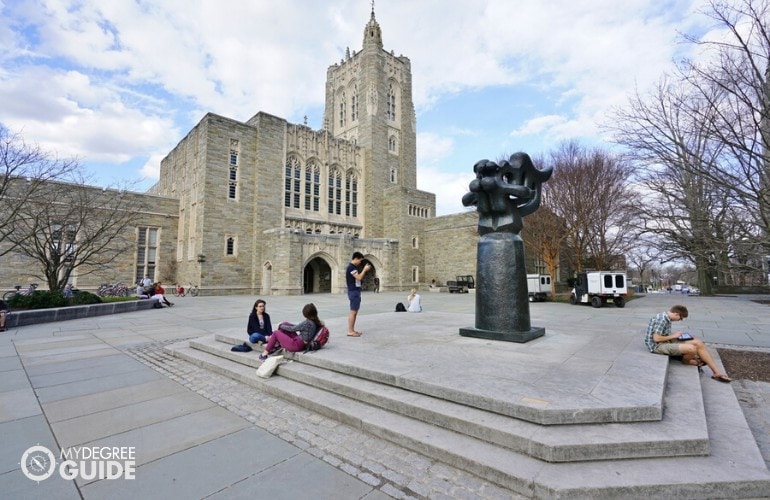
There’s a question that may already be on your mind if you’ve been hunting for schools with respected education programs. Do you need regional accreditation?
First, regional accreditation isn’t something that’s mandatory in order for you to be able to become a teacher. However, it does provide plenty of benefits for future educators.
A college or university with regional accreditation has been recognized as a distinguished institution by one of the seven agencies for regional accreditation in the United States recognized by the Council for Higher Education Accreditation (CHEA).
The big perk of going with a regionally accredited school is prestige. In addition, you’ll have better odds of being able to transfer credits or getting approved through a corporate tuition reimbursement plan if you attend a regionally accredited school.
The good news is that there’s a good chance the school you’re considering is regionally accredited. Close to 85 percent of all colleges and universities in the United States are accredited.
Elementary Education Professional Organizations

A teacher’s best ally is another teacher. That’s why it’s worth your time to consider joining one of the many respected professional organizations for elementary educators.
- The National Association for the Education of Young Children (NAEYC) brings together early childhood education teachers, center directors, policymakers, advocates, and families of young children for the goal of promoting high-quality learning. The NAEYC Annual Conference is the world’s largest early childhood education conference. In addition, the association offers resources and tools for personal development for educators.
- Childhood Education International is an organization with global membership. Its primary goal is to advocate for improved conditions, programs, and practices for children in education and life. The organization is focused on coming up with sustainable, fair solutions to education problems.
- The National Education Association (NEA) represents the interests of public school teachers and education personnel. It is the country’s largest labor union and professional interest group.
As default lifelong learners, elementary school teachers often get satisfaction from staying up to date via professional organizations. Membership is a great way to maintain a “training” mindset and connect with other educators.
Education & Teacher Licensure

Is a bachelor’s degree enough to become a teacher? It’s a big question. First, the situation varies by state and district.
Here’s the general rundown of what the path to becoming a teacher looks like:
- Earn a bachelor’s degree in education
- Complete the student-teaching requirement for the state you wish to teach in
- Pass your state’s teaching exam
- Apply for state certification
It’s possible that you’ll need to pass the Praxis test before you’re permitted to teach in a district. This is a standardized test specifically for educators.
Private schools don’t necessarily have the same requirements to teach as public schools. It’s really up to each private institution to determine hiring requirements.
However, being certified to teach in a public school is certainly something that decorates a teacher’s resume nicely.
Financial Aid
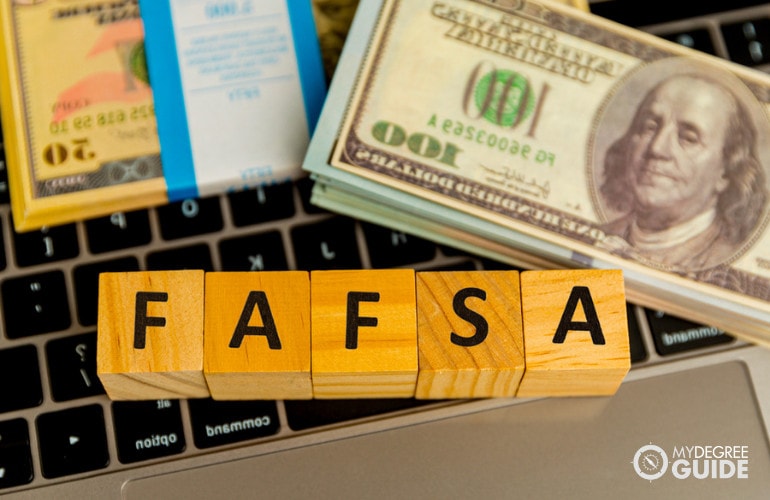
There are many options for financial aid that can make it possible for you to enroll in a teacher education program. A good starting point is to fill out a FAFSA form to see how much federal aid you can qualify for.
Editorial Listing ShortCode:
In addition, you may be able to access federal grants, loans, and work-study programs that can greatly reduce your tuition obligation.
The institution you’re attending may also provide loans, grants, and scholarships. There are also some specific scholarship opportunities open to students pursuing degrees in elementary education.
Education & Teaching Scholarships

It is a widely recognized fact that the world needs more great teachers. This is precisely why there are so many exciting scholarship opportunities available to future educators. Here’s a look at the ones to bookmark if you’re wondering how you’ll finance your education:
- The American Foundation for the Blind – Rudolph Dillman Memorial Scholarship is a one-time opportunity available to undergraduate or graduate students studying in the field of rehabilitation or education of blind or visually impaired learners. It’s necessary to submit proof of legal blindness when applying.
- The Edward G. and Helen A. Borgens Elementary Teacher Education Scholarship is a one-time opportunity for students seeking to teach at the elementary level. Sophomore status and a GPA of at least 3.5 are required to qualify.
- The Isabel M. Herson Scholarship in Education is open to all full-time undergraduate and graduate students pursuing degrees in elementary or secondary education.
- The Nancy Larson Foundation Scholarship is open to college students studying to become elementary teachers. Anyone who has declared an elementary education major is invited to apply.
- Phi Delta Kappa (PDK) Prospective Educator Scholarships are available for high school seniors and undergraduate students who are pursuing careers in teaching. However, applicants are only qualified if they are connected to the PDK family of associations through membership in Educators Rising, PDK International, or Pi Lambda Theta.
Scholarships can reduce your personal tuition obligation by thousands of dollars each semester. It’s always wise to be on the hunt for new scholarship opportunities once you enroll in college.
Additionally, your advisors or instructors may be able to direct you toward relevant scholarship opportunities.

Can You Get an Elementary Education Degree Online?
Yes, it’s actually becoming more common to complete full or partial coursework for an education degree online.
Education majors still need to complete the same core undergraduate requirements as students pursuing other majors. This makes it very easy to complete “mainstream” elementary education courses online.
Many people find online teacher degrees attractive because they remove many of the barriers to obtaining a bachelor’s degree and accompanying certification. Many people simply cannot make it to campus due to long commute times, work schedules, or childcare commitments.
An online program offers a very convenient degree path to becoming an elementary school-level teacher that provides the same instruction and legitimacy as an on-campus degree experience.
Can I Go to School Online to Become a Teacher?

Yes, it’s fully possible to complete your courses online when studying to become a teacher. Even an online program may have some on-site requirements that need to be fulfilled prior to graduation.
You will still need to fulfill any student-teaching obligation that is a requirement of your college or state. In addition, many education majors must complete requirements for classroom observation that are important for developing hands-on skills.
Editorial Listing ShortCode:
Luckily, today’s online programs integrate a student’s desire to learn remotely with the practical side of getting in that very relevant classroom time.
It’s important to make sure that you’re able to comply with all of the requirements for obtaining your degree upon your enrollment in a program.
How Long Does It Take to Get an Elementary Education Degree?

A bachelor’s degree in elementary education is considered a four-year degree, while a traditional or online associates degree in elementary education is a two-year degree. This is how long it should take you to complete your degree if you’re attending on a full-time basis. Of course, there are some factors that could shorten or expand your time as a student.
Some students need an extra semester to complete elementary education degrees because of the time needed for student-teaching requirements. Others simply cannot take a full course load every semester due to work or personal obligations.
It’s also possible to potentially shave a semester off of your studies by taking extra courses during a school’s winter or summer sessions. Your specific path to graduation can be discussed with your advisor.
How Hard Is It to Get a Degree in Elementary Education?
An elementary education program presents its own unique challenges and benefits. This certainly isn’t a major that anyone should choose because they’re simply looking for an “easy” degree option. You’ll be required to complete and pass high-level courses that cover everything from student psychology to education theory.
Focusing on the difficulty level of a degree path isn’t necessarily the best way to look at your options. Instead, it’s important to focus on what makes this degree option a good fit for you. Do you have the skills and disposition that are suited for a classroom environment?
What Can I Do With My Bachelors of Science in Elementary Education After Graduation?

The obvious option is to simply apply for jobs as a K-5 school teacher. Of course, you may prefer to play a role in shaping the littlest minds by working in a preschool setting. Many Head Start and readiness programs for preschool-aged children are operated by towns or states.
You may also decide that you’re not done with your education once you graduate with your bachelor’s degree in education. Many new elementary education graduates decide to immediately enter a master’s degree program.
A master’s degree in education can help you to become an expert in a specialty. In addition, pursuing another degree after your undergraduate career can open up doors to be an administrator or school district planner.
What Is My Earning Potential With an Online Elementary Education Degree?
The median pay for elementary school teachers stands at $60,940 per year (Bureau of Labor Statistics). Of course, your income potential varies greatly based on the state and school district you work in.
Administrators, like principals and school superintendents, routinely make around six-figure salaries.
What Type of Online Elementary Education Degree Should I Get?

Have you taken the time to explore your interests, passions, and skills? This is how a future education major should decide which degree specialty to pursue.
The benefit of an elementary education degree is that most towns and school districts have several elementary schools.
By contrast, most towns have just one or two high schools. That means that you’ll probably have more choices regarding where to teach as an elementary school teacher once you settle into a location.
Editorial Listing ShortCode:
Simply choosing an elementary education degree without a specialty provides room for being qualified to teach in any classroom in any elementary school. However, you may feel called to a specialty that takes you out of the traditional role of standing in front of a classroom.
Anyone with a passion for helping nontraditional learners to thrive may feel called to become a special education major.
Your education can help prepare you to handle the many logistical, interpersonal, and legal aspects of managing a classroom with special-needs learners.

Someone who is inspired to share a love of reading may find a career as a reading specialist to be particularly satisfying. After all, you may be the person who introduces students to what will become their favorite books for the rest of their lives.
Options like becoming an early education expert or teaching assistant provide you with a space for utilizing your patience, attention to detail, and the ability to inspire in an immersive, interactive classroom setting.
What type of environment do you see yourself thriving in for the next 30 years? Choose a specialty or area of concentration that will allow you to feel inspired to share and motivate for decades to come.
Are There Affordable Online Elementary Education Degrees Available?

Tuition costs vary by school. One way that future teachers are cutting costs related to attending college is by simply studying online.
Getting an online elementary education degree is almost certainly going to be less expensive than a comparable on-campus program when you consider that costs for room and board won’t apply. There is no need to pay commuting costs related to the travel between your home and campus for daily classes.
It’s important to break down the price per semester hour when comparing prices between various colleges and universities. Always weigh the number of credits required against cost when getting a full picture.
Most colleges and universities require elementary education students to complete up to 120 career credits in order to qualify for graduation.
You can do your homework regarding true cost comparisons by simply adding up the total credit requirements against price per credit to see how much each degree actually costs.
Universities Offering Elementary Education Bachelor’s Degree Programs
Methodology: The following school list is in alphabetical order. To be included, a college or university must be regionally accredited and offer degree programs online or in a hybrid format.

With the idea that students who share a common faith should come together for a larger purpose, Asbury University opened in 1890. Asbury University is a private academic institute offering classes on in-person and through its distance education program to help students grown in their academic field and gain an undergraduate or graduate degree.
- BS in Elementary Education
Asbury University is accredited by the Southern Association of Colleges and Schools.

Launching its private school in 1897, Bay Path University helps women around the world to acquire an undergraduate degree through face-to-face courses or online. If students are looking to earn a graduate degree, BU has more than thirty programs to serve both men and women advance their educational careers.
- BA in Liberal Studies – Elementary Education
Bay Path University is accredited by the New England Commission of Higher Education.

Settled in 1887, Campbell University is a Baptist-affiliated postsecondary school in NC that offers a private education to a diverse population of students. With more than a hundred curriculums to choose from, Campbell University’s four-year degree programs and graduate programs assist students in obtaining the degrees they need.
- BS in Elementary Education
Campbell University is accredited by the Southern Association of Colleges and Schools Commission on Colleges.

As a private, faith-based school in the heart of Missouri, Central Methodist University opened in 1854. CMU strives to assist students in overcoming personal challenges to achieve a two-year, four-year, or master’s degree. With on-campus courses and flexible online courses, Central Methodist University works to help all students find success.
- BS in Education – Elementary Education
CMU is officially accredited and/or recognized by the Higher Learning Commission.

Dakota State University is a postsecondary school that started in 1881. Offering a range of degree options leading to 2-year, 4-year, and up to a doctorate, DSU is known for its many programs, including computer science, education, health, and technology. Its connections with Homeland Security display some of these programs.
- BS in Education – Elementary Education
Dakota State University is accredited by the Higher Learning Commission.

East Carolina University opened in 1907. It has since then spread to various counties throughout the world through distance education, co-ops, and study abroad programs, becoming a leader in public education.
Its home campus in NC houses thousands of students yearly who engage in one of the many four-year degrees, master’s degree, or doctoral programs offered.
- BS in Elementary Education
East Carolina University is accredited by the Southern Association of Colleges and Schools Commission on Colleges.
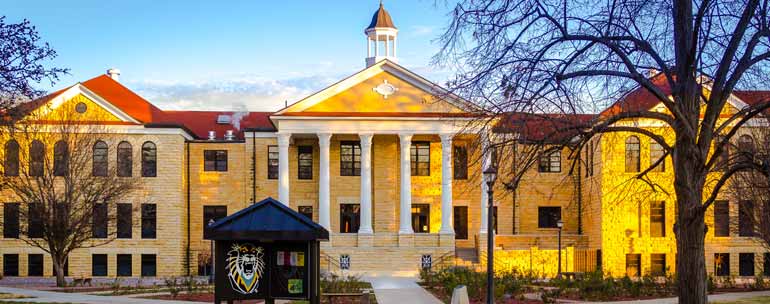
Opening its doors in 1902, Fort Hays State University works tirelessly to provide world-class education to students looking to gain a bachelor’s degree or graduate degree in one of the many majors available at FHSU. Fort Hays takes care of its community by helping with economic development, outreach programs, and youth education programs.
- BS in Elementary Education
FHSU is regionally accredited by the Higher Learning Commission.

Gardner-Webb University is a private faith-based college located in the piedmont area of NC. It opened in 1905 and focuses on aiding students to gain an undergraduate or graduate degree in one of the many professional programs offered.
Giving each student a solid liberal arts foundation, GWU is well known for programs such as education, health, business, and psychology.
- BS in Elementary Education
Gardner-Webb University is accredited by the Southern Association of Colleges and Schools Commission on Colleges.

Rooted by its Christian faith, Grand Canyon University started in 1949 and now delivers a strong education to all religious denominations. Grand Canyon has hundreds of majors to help students decide on a career path that will lead to obtaining an undergraduate, graduate, and doctoral education level. GCU gives all students a distance-learning option.
- BS in Elementary Education – Christian Education
- BS in Elementary Education – English as a Second Language
- BS in Elementary Education and Special Education
Grand Canyon University has been accredited by the Higher Learning Commission.

Judson College began in 1838 in Marion, Alabama, as a private Baptist school for women. Today, it continues to help women find their place in the world by providing a well-rounded educational experience. With six students to each faculty member, Judson helps students achieve an associate in nursing, four-year degrees, or pre-professional programs.
- BS in Elementary Education
Judson College is accredited by the Southern Association of Colleges and Schools Commission on Colleges.

Kanas State University became an accredited public school in 1863. K-State has undergraduate and graduate degree programs to help students rise to the challenges of academic excellence and innovative discovery.
Doctorate degrees from K-state are respected throughout the world. It is known for many majors, such as education, nuclear science, and technology.
- Bachelor’s in Elementary Education
Kansas State University is accredited by the Higher Learning Commission of the North Central Association of Colleges and Schools.

Founded with the idea of providing faith-based education that allows students spiritual and academic growth, Liberty University opened in 1771.
Liberty University focuses on instructing students using solution-oriented investigations that leaves the world community a better place. With all levels of degrees, ranging from a two-year program to a doctoral degree, Liberty has a program for all students to succeed.
- Bachelor of Education in Elementary Education
- BS in Elementary Education – Interdisciplinary Studies
Liberty University is accredited by the Southern Association of Colleges and Schools Commission on Colleges.

Education was the first BA degree offered after Mayville State University after it opened in 1889. MSU provides a sound public education to students who wish to achieve an AA, BA, BS, or a MA degree in one of the many programs offered at Mayville. Online course options give students the flexibility to continue the educational process.
- BS in Education – Elementary Education
Mayville State University is accredited by Higher Learning Commission.

Midway University offers a robust education to students looking to receive an AA degree, a bachelor’s degree, or a master’s degree in an array of programs. Midway has been providing a top-notch private education since 1847. Online programs offered at Midway allow for a quicker degree path with 8-week course options. It is named by U.S. News & World Report as one of the top universities in the South.
- BA in Elementary Education
Midway University is accredited by Southern Association of Colleges and Schools, Commission on Colleges.

Mississippi State University started providing public education to students in 1878. Rich in history and tradition, Mississippi State awards bachelor’s degrees, MA degrees, doctoral, and specialist degrees to a diverse student population.
MSU is a large contributor to the area’s economic, research, and technology development. Online courses help MSU reach students globally.
- BS in Elementary Education
Mississippi State University is accredited by the Southern Association of Colleges and Schools Commission on Colleges.

As a private school for adult learning, National University began giving educational opportunities in 1971. With the advancements of technology throughout the years, National University has added accelerated distance learning programs to their array of degree options. It offers all levels of degrees for students all over the world.
- BA in Elementary Education
National University is accredited by the Western Association of Schools and Colleges.

The year 1930 marked the beginning of Old Dominion University’s long history of public education. This internationally recognized postsecondary school has almost one-hundred bachelor programs and a multitude of master’s and doctoral programs that unite research with academics to supply students with a well-rounded education.
Using face-to-face and online platforms, Old Dominion expands its programs across the globe.
- BS in Elementary Education
Old Dominion University is accredited by the Southern Association of Colleges and Schools Commission on Colleges.

Originating in 1927, Regis University prides itself on the development of its academic programs that give students to secure an undergraduate, graduate, or professional degree through its interactive programs.
Regis is known for providing private education in education, business, healthcare, and more. Distance learning is another way Regis University goes beyond to help students excel.
- BA in Elementary Education
Regis University is accredited by The Higher Learning Commission.

St Petersburg College is a vigorous public school that serves students looking to earn a certificate, associate degree, or a bachelor’s degree in over one-hundred program options. Opening in 1927, St Petersburg College is dedicated to providing education in areas that are high in demand through online and face-to-face course options.
- BS in Elementary Education
St. Petersburg College is accredited by the Southern Association of Colleges and Schools Commission on Colleges.

The University of Alaska – Southeast began in 1972 and is located along the shore s of Alaska. UAS gives students access to an affordable public postsecondary education that integrates science and technology into its many graduate and undergraduate programs.
Taking full advantage of the campus locations, marine and maritime studies are a significant part of many programs.
- BA in Elementary Education
The University of Alaska Southeast is accredited by the Northwest Commission on Colleges and Universities.

Starting in 1931, The University of Louisiana at Monroe consists of five colleges that lead students to obtain an undergraduate and graduate degree. This public school is known for its history, economic development, and research facilities. As a public school, it raises the bar for academic excellence and community service.
- BS in Elementary Education
The University of Louisiana at Monroe is accredited by the Southern Association of Colleges and Schools Commission on Colleges.

Offering public educational degree paths ranging from four-year to doctoral, University of North Carolina – Wilmington has been serving students since 1947. Research and innovation take precedence and allows students hand-on experience in their degree field.
Working with experts, faculty, and peers, students learn new ways to solve problems facing the world today.
- BA in Elementary Education
The University of North Carolina Wilmington is accredited by the Southern Association of Colleges and Schools Commission on Colleges.

Established in 1901, the University of Southern Mississippi offers a sound public education to students looking to have educational opportunities that lead to an undergraduate, graduate, or doctorate.
Research a vital aspect of the many programs offered at the University of Southern Mississippi, and some programs have online options for students who need flexibility in their schedule.
- BS in Elementary Education
The University of Southern Mississippi is accredited by the Southern Association of Colleges and Schools Commission on Colleges.
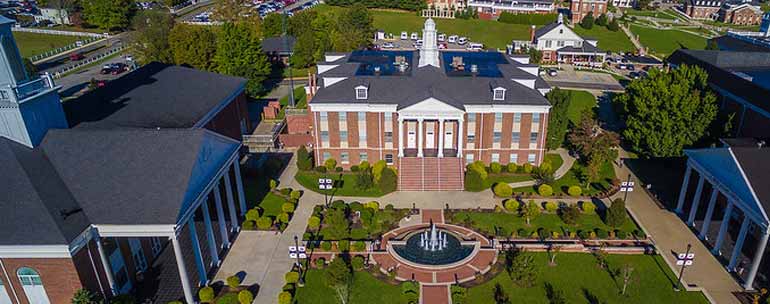
The University of the Cumberlands began in 1888 as a postsecondary school in the state of Kentucky. This private university works to help students achieve their dreams of earning an undergraduate and graduate degree in their career field.
One way the University of the Cumberlands does this is by adding community service credits to curriculums that match learning objectives.
- Bachelor’s in Elementary Education
The University of the Cumberlands is accredited by the Southern Association of Colleges and Schools Commission on Colleges.

University of Wisconsin – Superior has been a leader in training educators since it opened in 1893. There are many other majors at the University of Wisconsin, but each program is based on a solid liberal arts foundation. This public research facility awards associate, bachelor’s, and master’s degrees. It also grants specialist’s degrees.
- BA in Elementary Education
- BS in Elementary Education
The University of Wisconsin-Superior is accredited by the Higher Learning Commission.

Walden University offers online bachelor’s, master’s, and doctorate programs.
- BS in Elementary Education
Walden is accredited by The Higher Learning Commission.

Founded in 1997, Western Governors University launched its technology-driven education system delivering quality academia via an online platform.
As a private university, small classes and access to instructors come easy for students enrolled in one of the many four-year degrees and master’s degree programs offered at WGU. Education, business, and technology are some of the majors offered.
- BA in Elementary Education
Western Governors University is accredited by the Northwest Commission on Colleges and Universities.
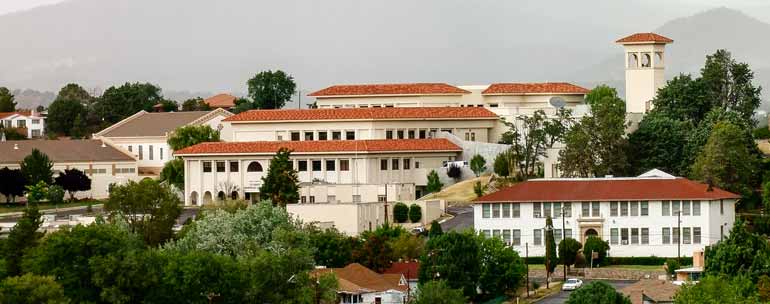
With numerous awards for excellence, Western New Mexico University’s ability to provide vast public education opportunities has shined since it opened in 1893. WNMU has twenty associate degrees and more than forty bachelor’s degree programs.
There are also several graduate degrees offered through Western New Mexico University. Many of its programs are also offered online.
- BS in Education – Elementary Education
Western New Mexico University is accredited by the Higher Learning Commission.

Established in 1865, Wichita State University expands over six major colleges and online programs to offer students hundreds of academic programs to aid in their education process.
With over sixty undergraduate programs and a graduate school, Wichita’s public university is also rich with research opportunities.
- BA in Elementary Education
Wichita State is accredited by the Higher Learning Commission of the North Central Association of Colleges and Schools.

Founded in 1968, Wilmington University offers two and four-year degree programs, as well as graduate and doctorate degrees to students around the world. Through on-campus and distance learning, students can take advantage of all that Wilmington University has to offer. As a private college WU is dedicated to helping students succeed.
- BS in Education Studies – Elementary Education
Wilmington University is accredited by the Middle States Commission on Higher Education.
Getting Your Elementary Education Degree Online

What other degree path allows you to enjoy such a satisfying position while also enjoying stability, room for growth, and attractive compensation? As a future teacher, you probably get excited just thinking about the day when you’ll have your own classroom.
Make the decision to get there by finding an online elementary education program that removes obstacles to getting your degree.
This is your chance to learn about yourself while honing new skills for developing effective learning in others via an elementary education online degree. An elementary education program can give you the tools to channel your love of teaching kids into a real career.
It’s a great time to begin the process of finding and applying to an online program that offers what you need to get on the path to certification.

